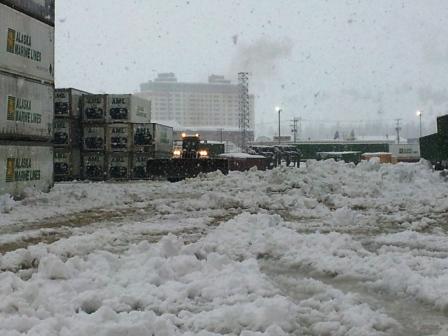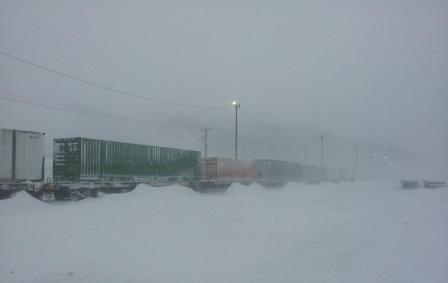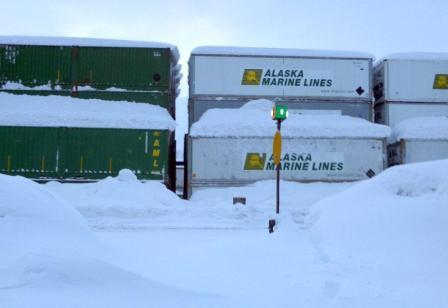Historic storms hit Alaska and Washington this winter and Lynden companies pulled together to keep the freight moving and equipment operating in the harsh temperatures and record snows. Hardest hit is the Railbelt in Central Alaska while Whittier, Fairbanks, Anchorage and Kenai have had adverse weather for most of the winter. Whittier has had 380 inches of snow this winter, and Valdez has received 403.9 inches of snow and is considered the snowiest locale in America. Cordova and Whittier are not far behind. Anchorage has had over 10 feet of snow this year. “With snowfall expected to be heavy in March*, we have a shot at the all-time record,” says Scott Hicks, Vice President of Operations for Alaska West Express.

Conditions at the Alaska Railroad Corp. yard in Whittier, AK.
Compounding problems was a cycle of storms which hampered barge arrivals off and on since October. The Whittier terminal has been dealt further blows by storms which bring heavy snow, then melting conditions. The cold temperatures cause train wheels to freeze onto the tracks and make rail, truck and forklift operations very difficult. “We have experienced crippling conditions for rail and cargo operations,” Scott explains. Excessive ice buildup throughout the terminal shut down all rail movement in or out of Whittier for days. Avalanches caused train delays extending the time required for loading and unloading our barges, and tug crews have battled through storms, rough seas and lengthy voyages.

“Our crew in Whittier has worked very hard to keep the freight, trains, trucks and barges moving,” Scott says. “They have worked almost every weekend since the first part of November. This includes our drivers shuttling and trucking loads on the weekends to take care of the priority freight for customers. Anchorage yard crews have also worked around the clock to unload trains and keep the trains and trucks moving. Fairbanks crews have battled temperatures as low as minus-60 degrees.”

The Nana Provider has been cycled in as a fourth rail barge which has helped maintain weekly service. “We have received help from multiple Lynden companies and I would like to thank them,” Scott says. “Our partners Western Towboat and the Alaska Railroad also deserve much credit for helping us ‘weather the storm.’” Lynden employees have done an outstanding job through this very difficult time with manpower and schedule changes. It truly is a team effort and a great example of what Lynden is capable of.”
In Washington, winter storms also brought freezing rain, heavy snow and extended road closures on Snoqualmie Pass due to avalanches. The governor declared a state of emergency and waived the hours of service limits for drivers hauling milk from farms to processing plants.
“Our Sunnyside and Moses Lake Milky Way drivers did an extraordinary job given the challenges they faced. They received help from the Portland, Chehalis, Skagit, Whatcom and Seattle services centers to deliver loads and keep our customers from having to dump milk,” says LTI, Inc. President Brad Williamson. Dispatchers met twice a day via teleconference and worked around the clock coordinating with the milk plants. It was an outstanding display of teamwork throughout the organization.”
As a side-note, LTI, Inc. delivered a record amount of road de-icer salt this winter to the Washington Department of Transportation and the City of Seattle. During January, LTI, Inc. trucks moved 30,771 tons of bulk salt from stockpiles at Seattle and Moses Lake to maintenance sites around the state.
* Note: This article was originally written in mid-March, 2012.
Topics from this blog: LTI Inc. Alaska West Express Milky Way trucking Alaska United States Bulk Ground
